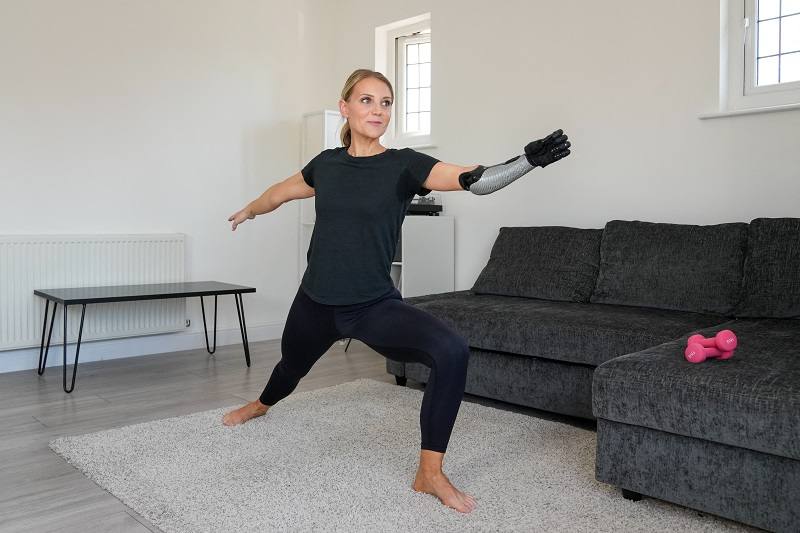Bionic hand can be updated with new gestures, anytime, anywhere

Jessica Smith poses during a workout while using her new bionic hand in London, on Aug. 12.
16:29 JST, September 1, 2022
LEEDS, England (Reuters) — Australian swimmer Jessica Smith has had an uneasy relationship with prosthetics since a childhood accident, but her convictions are being challenged by a British bionic hand that can be updated remotely anywhere in the world.
The 2004 Athens Paralympian was born without a left hand.
Her parents were advised to fit a prosthesis to help with her development, but the device caused her to upset a boiling kettle when she was a toddler, leading to burns on 15% of her body.
“There’s always been an association between the fact this prosthetic aid didn’t actually help, it created the most traumatic event in my life,” she said.
But her curiosity was sparked when she was approached by Covvi, based in Leeds, northern England, to try its Nexus hand.
Knowing it would be an emotional challenge, Smith was fitted with the device in April at the age of 37. “I think that I was ready to try something like this,” she said.
Bionic hands convert electrical impulses from the muscles in the upper arm into movement powered by motors in the hand, enabling a user to hold a glass, open a door or pick up an egg.
Simon Pollard, who founded Covvi five years ago, said he wanted to add bluetooth to the device to allow the company’s specialists to update it via an app.
“The fact we can change some of the things that the customer wants remotely is a really powerful thing and a first to market,” the chief executive said.
Some rival bionic hands can be app-controlled, but Pollard said the ability to talk to a single device set the Nexus apart.
To do that, anonymized data is collected for every user, a task managed by partner NetApp.
Pollard said Covvi had signed up 27 distributors globally, including in Australia, China and the United States, and he aimed to increase monthly production to 100.
Smith, who is a speaker and children’s author, said Covvi was already creating new movements for her.
“I’ve had a few kids ask if I can do different hand gestures, some polite some not so polite,” she said. “I asked Covvi this morning, and I know that will be done in the next couple of hours.”
She said the tech was not just changing her life, it was changing the lives of her three children.
“They think it’s amazing and I’m like half human-half robot,” she said.
She said the “bionic” appearance of the hand was an attraction, given her pride in difference.
“I’m not trying to hide who I am,” she said. “I’m adding and expanding on who I am by being able to access technology that’s never been available before.”



